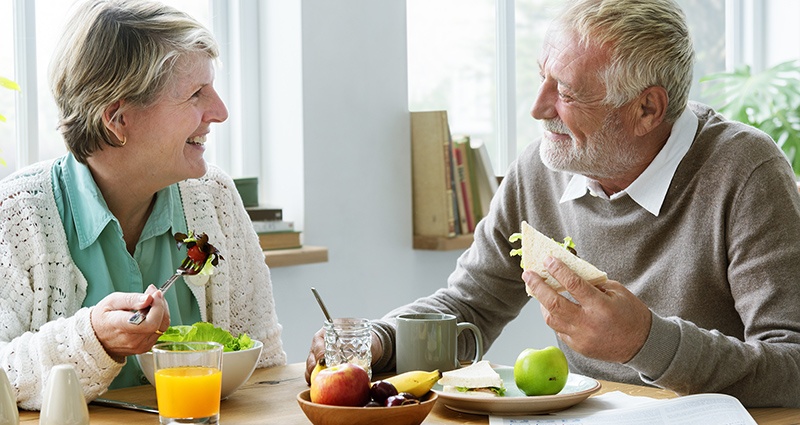Safe and healthy eating is important no matter your age. But as we grow older, food-related illnesses can be life-threatening as your body has more trouble fighting off microbes. If you struggle with health problems such as diabetes or kidney disease, eating unsafe food can make you sick.
Making sure you are putting safe, healthy foods in your body can make a difference in your health and improve how you feel. There are special foods and safety tips you can follow to be sure you are eating as healthy and safe as possible.
High-Risk Foods to Avoid
Avoiding these foods can help ensure your risk is low for getting sick from food-related illnesses:
- Salt. According to The American Heart Association, consuming a lot of sodium can increase your chances for high blood pressure which in turn increases your chances of a heart attack and cardiovascular disease. High levels of sodium also increase the risk of stroke and kidney disease. The maximum amount of salt consumed should be about one teaspoon or 2,300 mg each day. Lower levels close to 1,500 mg per day is beneficial for high blood pressure sufferers. A healthier alternative to salt is using herbs and spices to season your food.
- Raw or undercooked meat, poultry, shellfish, and fish. Eating raw or undercooked meat can increase your chances of contracting E.coli, salmonella, trichinosis or toxoplasmosis infections. Properly cook beef, lamb, or pork to an internal temperature of 145 degrees Fahrenheit, ground red meat to 160 degrees, and 165 degrees for poultry. Seafood should be cooked to an internal temperature of 145 degrees.
- Hot dogs and deli meats. Ready-to-eat meats can be contaminated by listeria. Deli meat and hot dogs should be reheated to at least 165 degrees to avoid contamination.
- Raw or unpasteurized milk and milk products. Compared to pasteurized milk, unpasteurized milk breeds and harbors bacteria. It is safer for older adults to stick with pasteurized milk and pasteurized milk products because it is heated to kill the harmful bacteria.
- Raw or undercooked eggs. Raw eggs can harbor salmonella which can be dangerous for older adults. Be sure all eggs are cooked or baked thoroughly.
- Unpasteurized juice from fruits and vegetables. As with unpasteurized milk, harmful bacteria can grow in unpasteurized juices made from fruit and vegetables. Pasteurized juice is much safer as it is heated to kill bacteria.
Healthy and Safe Eating
Storing and cooking food safely decreases your chances of contracting a foodborne illness. Follow these simple tips to be sure what you are eating is healthy and safe.
Proper food storage.
- Read the labels. If the label says to “refrigerate after opening,” be sure to store your opened food in the refrigerator.
- Refrigerate leftovers. If you make a big meal and have leftovers, be sure to place them in the refrigerator within two hours of buying or cooking it. Throw out any unused leftovers within 3 to 4 days. Refrigerators should always be at 40 degrees or below to slow the growth of microbes.
- Check for an expiration date on packaged foods. Always double check the expiration date as sometimes packaged foods can be forgotten about and can be older than you think.
Food Preparation and Cooking
- Cleaning. Be sure all food preparation surfaces and utensils are cleaned with hot, soapy water. Rinse off fruits and vegetables under running water and rinse off lids of cans before opening. Keep storage areas clean especially refrigerators. If there is a spill, clean with hot, soapy water
- Keep meats and eggs separated. Keep all raw meat, poultry, seafood, and eggs away from food that will not be cooked. If you are preparing raw meat, be sure to wash your hands before you handle any uncooked items. Wash cutting boards, utensils and preparation surfaces before reusing them for other food.
- Cooking. Use a food thermometer to monitor the internal temperature. If reheating sauces, make sure to bring it to a boil.
Safe Eating While Dining Out
When it’s time to take a break from cooking for yourself, dining out is always fun! However, you want to be sure that you are eating at a restaurant that takes food safety seriously. Here are some things to watch out for:
- Ask your waiter or waitress how the food on the menu is prepared. If there is something that looks appetizing to you but unsure if you should eat it, always ask questions.
- Go to a restaurant that looks clean.
- Buffets, while convenient, are probably best to avoid. Food can be left out for an extended period and may not be appropriately checked for temperature.
Dining at Kendal on Hudson
If you are a resident at Kendal on Hudson, you have the benefit of having your meals prepared by highly trained chefs! The Bistro offers three meals daily with a full menu for breakfast, lunch and dinner. The Formal Dining Room is open for dinner where you can enjoy the same menu and have a wait service. All meals are safely prepared and nutritionally balanced.
To learn more about Kendal on Hudson and all of the services and amenities we offer, visit us online or contact us today.

Share this article with your friends!











